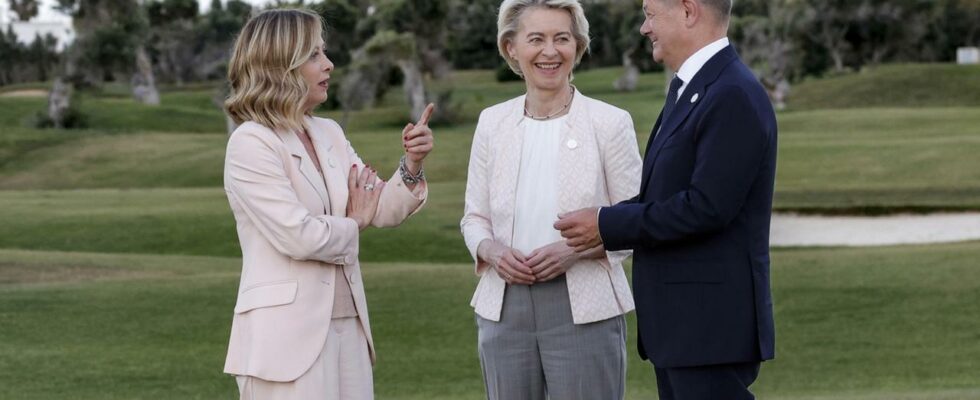After the European elections, the top EU jobs will be reassigned. What will happen next with von der Leyen, Michel, Borrell and Metsola? The heads of state and government are negotiating this starting today.
Just over a week ago, Europe’s citizens elected a new EU Parliament. Now the EU leaders are discussing the important personnel issues over dinner: Ursula von der Leyen will be there this evening for the start of the meeting in Brussels. But she will not be attending the dinner at which her political future is to be decided.
The EU heads of state and government will discuss the consequences of the election result over dinner. Some of them already had the opportunity to do so on the sidelines of the G7 summit in Italy and the Ukraine conferences in Berlin and Switzerland. The 27 states are discussing which party family will get which top job.
Von der Leyen and Michel have not always gotten along well in recent years. If the Commission President continues, she will probably have a different partner in the European Council in the future.
Von der Leyen would like to continue
First and foremost, it is about the leadership of Europe’s most powerful authority, which proposes laws and monitors compliance with the EU treaties: the EU Commission. CDU politician von der Leyen was the lead candidate of the successful Christian Democratic EPP. She would like to keep her office.
After the 2019 European elections, it took a good five weeks for the posts to be distributed. This time it could go faster. That would be the logical conclusion from the election result, at least from the point of view of EPP party and parliamentary group leader Manfred Weber. He appeals to the heads of state and government to respect the democratic vote for his party family and to confirm von der Leyen as Commission President. Unlike usual in the European Council, this does not require a unanimous decision, but a qualified majority.
Scholz pushes the pace
12 of the 27 heads of state and government at the summit table belong to the EPP party family. Their support for von der Leyen seems certain. Weber spoke to them immediately after the election and will do so again before today’s dinner.
In addition, at least three other member states whose leadership does not belong to the EPP must vote for von der Leyen. These include Germany and France, for example. Chancellor Olaf Scholz knows the German Commission President from joint cabinet meetings and has worked well with her in recent years. Scholz is calling for a quick solution and is in favor of resolving Europe’s personnel issues this month.
This is also likely to be in the interest of the French president. Emmanuel Macron had previously suggested former ECB President Mario Draghi for a top EU post. After his alliance’s defeat in the European elections, however, Macron now has enough to do preparing for parliamentary elections. In addition, it was he who proposed von der Leyen for the post in 2019. One dissenting vote among the 27 seems certain – that of Hungary’s Prime Minister Viktor Orban.
EU Council President and Foreign Affairs Representative could be replaced
In addition to the EPP, other parties from the political center are expected to play a role in the European personnel poker. Portugal’s former Prime Minister Antonio Costa, a socialist, could become President of the Council. As the successor to the Belgian Charles Michel, he would be responsible for organizing and leading the EU summits. The liberal Estonian Prime Minister Kaja Kallas is being considered as the EU’s foreign policy chief. The regional proportional representation speaks in Kallas’ favor: Eastern Europe is demanding a job as EU leader.
The post of President of Parliament could go to the EPP: The Maltese Christian Democrat Roberta Metsola would like to continue. If the 27 quickly put together a corresponding personnel package, they could formally propose it at the regular EU summit in just under two weeks. After that, it will be Parliament’s turn to elect the Commission President. The groups are still sorting themselves out there.
Dispute over Meloni as “Majority provider”
EPP group leader Weber, who is supposed to organize the majority for von der Leyen, is initially negotiating with the Social Democrats and Liberals about personnel issues and common ground on the matter. The three groups together have 406 votes.
At least 361 are needed; dissenters are expected in the secret vote. Weber and von der Leyen are also not ruling out talks with the ultra-right Fratelli d’Italia party of Italian Prime Minister Giorgia Meloni.
In this case, however, the SPD wants to pull out. The Greens have also offered to be a negotiating partner for the EPP. It is unclear whether the EU Parliament will be able to vote on the new Commission President in the first week of its session in mid-July. This depends not least on the results of today’s Brussels dinner.

